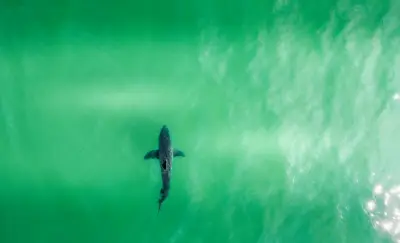Shark prompts closure at Seacliffe State Beach

By Pk Hattis Santa Cruz Sentinel APTOS The shoreline around Seacliff State Beach will close for the next couple of days after a local youth emerged from the water unscathed despite an apparent encounter with a shark Around a m Tuesday first responders with State Parks and neighboring fire and law enforcement agencies were dispatched to what is known colloquially as the Rio Del Mar Platforms Beach after receiving reports of a shark attack State Parks Constituents Safety Superintendent for the Santa Cruz Region Gabe McKenna communicated the Sentinel However the response was canceled shortly thereafter when additional information revealed no attack had occurred despite a swimmer appearing to have had a brush with the fearsome sea predator Further inquiry revealed that a youth aide with the Rio Del Mar Junior Lifeguard campaign had set out that morning to drop a swim buoy out in the water But when he was about yards offshore according to McKenna the youth noted he witnessed what appeared to be a shark crash into the buoy he was swimming with before ricocheting off and bumping up against him Our lifeguards on the beach acted right now entered into the water and assisted the youth aide back to the beach safely announced McKenna adding that observers of the event estimated the shark was about - feet long Out of an abundance of caution McKenna revealed State Parks will close the beach until a m Thursday morning and the closure will extend a mile in both directions of the shoreline from where the encounter occurred which was near Tower The waters at New Brighton and Seacliff state beaches have garnered a reputation in newest years for attracting large sums of sharks especially juveniles during the late spring and summer months Experts described the Sentinel last year that as the sharks migrate from the equator to the poles they stop in the warm coastal enclave known among locals as shark park to heat up and feed on certain of the wildlife in the area Salvador Jorgensen a marine ecologist and assist professor at California State University Monterey Bay frequently conducts research in the area and reported the Sentinel last summer that he and his unit spotted juveniles in the water the bulk since At the time he explained numbers tended to peak in June before they tapered off through August or early September McKenna mentioned the Junior Guards venture will be impacted by this the majority latest happening and pursuits will remain shore-based for at least the next couple of days

